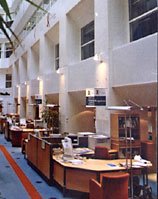
Just as all decent Englishmen and Britons prepare to celebrate the quartercentenary (or as some would say, quadracentenary) of the uncovering of the fiendish Gunpowder Plot in 1605, a landmark in the development of parliamentary democracy and the British Empire, our counterparts in the Chartered Institute of Library and Information Professionals (CILIP) have identified an issue which is at once both interesting and alarming. We have been alerted to this issue by our cross-linked web site Watching Them, Watching Us to whose publishers SQA is indebted.
 The Old: Guy Fawkes
The Old: Guy FawkesThe Terrorism Bill going through Parliament contains several clauses capable of placing librarians in the position of encouraging or facilitating acts of terrorism by virtue of their holding such material as terrorist training manuals or literature generally supportive of committing terrorist acts and making them available to terrorists.
The CILIP web site states:
In view of the wide and uncertain definition of what may constitute a terrorist publication, librarians and their governing bodies/institutions would be at risk of prosecution as the clauses currently stand. Lord Carlile, in his capacity as independent reviewer of anti-terrorist legislation, has expressed a concern about the potential for these clauses to criminalise academic and parliamentary research and serious journalism: his remarks may be said to apply equally to libraries and information services following their normal lawful business.(See CILIP professional guidance page)
 The New: Osama bin Laden
The New: Osama bin LadenCILIP has identified clauses 2, 3 and 17 as particularly problematic and a delegation comprising or supported by Toby Bainton (Society of College, National and University Libraries), Andy Birleson (Museums, Libraries and Archives Council), Guy Daines (CILIP), Clive Field (British Library), Robin Green (Consortium of Research Libraries), Gordon Hunt (National Library of Scotland), Barbara Tearle (British and Irish Association of Law Librarians), Scottish Confederation of University and Research Libraries and Scottish Library information Council is lobbying ministers.
Naturally archives has been omitted from consideration which in view of recent trends is hardly surprising. While the National Archives, National Council on Archives and other quasi-governmental archives bodies indulge themselves and us in the usual annual Archives Awareness Campaign, archivists are at risk of being criminalised. And who is speaking up for us? SQA as usual, of course.
So what exactly is the problem? Answer: clause 2 of the bill. This states that a terrorist publication can be one which constitutes.....information of assistance in the preparation or commission of such acts (Clause 2.2)
We asked Benedict Crumplethorne, SQA's principal spokesman to explain why archives offices and in particular local government archive services are as much at risk of running foul of the proposed new law as libraries.
For three reasons. Firstly because like librarians we hold material likely to be of assistance to terrorists in planning their activities and in fact the more so, secondly because we hold personal databases and thirdly because we are liable to be subject to surveillance. The material referred to could be either library or archive stock, deemed to be useful to terrorists; the personal databases including user databases are useful to the police and security services in investigating terrorism.
Local government record offices typically hold architects' plans of police stations, prisons, magistrates' courts, building societies and banks, Civil Defence and emergency planning records, untold quantities of personal databases, both manual and electronic, aerial photographs, Ordnance Survey maps, magistrates court records, county court records, plans of military establishments and even the records of manufacturers of defence equipment and civil engineering structures internationally, e.g. in-service aircraft, tanks, dams, reservoirs, power stations, electricity pylons, oil pipelines, dock installations, bridges, airports, railways, railway stations and tunnels. All these records are of great potential value to terrorists, for obvious reasons. Personal databases at issue include our actual archive stock and our administrative records including user databases.
We asked Benedict to justify the holding of material potentially of use to terrotists by local government record offices.
Justify? I don't need to justify it surely. I am reminded of a chat show programme in which Michael Caine was asked how he coped with stardom and being recognised in the street. He recalled an incident in which an east-ender who saw him in London exclaimed to him It's you, you're here! to which Caine replied Well I've got to be somewhere! You see, it's rather the same with archives. Archives have to be somewhere and that somewhere might as well be an archives office.
Our archives are transferred to us by their originating departments or are deposited with us by outside organisations including prisons, magistrates courts and county courts whose records constitute Public Records under the Public Records Act 1958. These are passed to us under the sanction of the National Archives. Building plans are held by us either in hard copy form (or as in the case of Tyne and Wear who destroyed theirs after microfilming) on microfiche under the old Public Health Act or Building Regulations.
All local government archivists keep prison, bank and building society plans under wraps of course, but much else that I have listed is freely available. Are we to restrict access to many hitherto inocuous classes of records? How do we achieve consistency across the domain? We desperately need a national audit of material which could be used by criminals including terrorists followed by national archives legislation. The situation puts public sector archivists in an invidious position because of the Freedom of Information Act. Either this will serve as a shield, or it will lead to the widespread perception of more archives being withheld and therefore undermine our traditionally good public relations.
CILIP has gone so far as to obtain the opinion of James Eadie of Blackstone Chambers, London, as to librarians' obligations to supply personal data and as to the basis of being subjected to surveillance under existing legislation. Naturally, this also applies to archivists. His summary opinion can be found here. SQA have also been able to read the online full legal opinion, restricted to CILIP members. Eadie advises that the police and security services have wide powers to investigate our stock and databases. Regarding surveillance, he believes librarians and therefore archivists will be most affected by an activity known as directed surveillance.

MI5's library; no doubt CILIP members here will put in a good word
Oddly, Eadie makes no mention of the Data Protection Act, which is the usual legislation under which the police obtain access to personal data held by libraries. The personal databases so far sought by police from archive offices are County Archive Research Network (CARN) ticket holder databases. Also, Eadie seems less concerned with librarians' stock, more with their own user databases, even though the web sites we have linked to address mainly the stock issue. This leads to an important contrast in the problem facing librarians and archivists resulting from the proposed Terrorism Bill. One the one hand librarians are concerned in practice with user databases; on the other, archivists are concerned in practice with stock and user databases, of which the former is likely to be the graver management problem.
The consequences of the Terrorism Bill and existing legislation can therefore be summarised as follows. Librarians risk being criminalised for possessing or making available some printed material promoting or facilitating terrorism, archivists will be criminalised for possessing and making available documentary material of similar potential use, both librarians and archivists will be subjected to surveillance and both will loose ground in the public relations battle through increased embargoing of records under Freedom of Information Act exemptions.
As at the time of blogging, it appears the act is going through unamended. SQA will keep a watching brief on the matter. In the meantime, chief archivists are advised to find some good lawyers.
Further reading: research paper on the bill click here
For further reading on Civil Service antics and ignorance click the folowing links:
Yes, Sir Humphrey and Archives? What Archives?
Safe in Our Hands?
Comments
Post a Comment